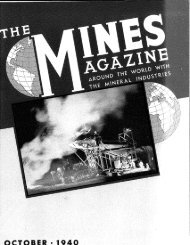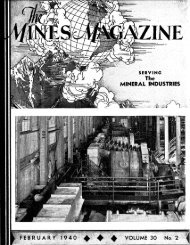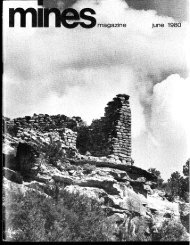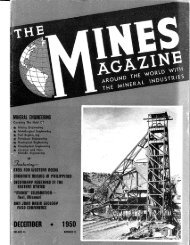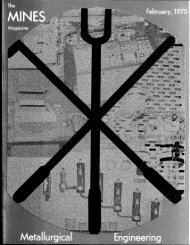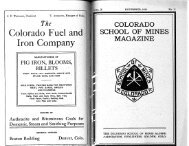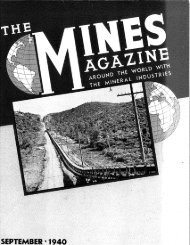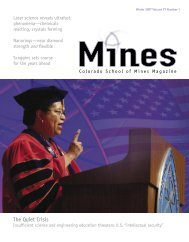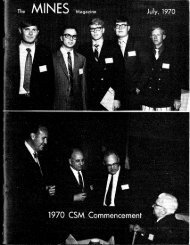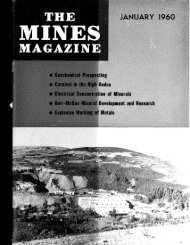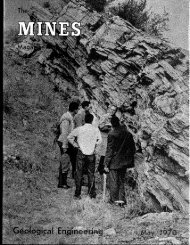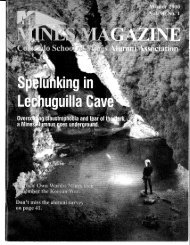A L U M N I N U M B C E L E B R A T I N G ... - Mines Magazine
A L U M N I N U M B C E L E B R A T I N G ... - Mines Magazine
A L U M N I N U M B C E L E B R A T I N G ... - Mines Magazine
Create successful ePaper yourself
Turn your PDF publications into a flip-book with our unique Google optimized e-Paper software.
" M I N E S M E N " I N M E T A L L U R G YByDONALD DYRENFORTH. '12Assisfanf Manager, MetallurgicalDivision, Dorr Co., Denver, Colo.Metallurgy includes the separationof the minerals from the gangue, thereduction and refining of the metalsfrom the minerals and the preparationof the metals for the manufacturerand the arts. The future metallurgistobtains his fundamentals at "<strong>Mines</strong>"that enables him to take the productsfrom the mines and transform theminto useful alloys or metals. By reasonof his physical and chemicalknowledge be is able to devise processesby which he changes the productsof nature to those of man.Who are these men of magic whotransform the works of nature? These"<strong>Mines</strong> Men" in metallurgy? Theyare the men who go on! And rightfullyone has good reason to wonder attbe character of men performing suchachievements. There are some menwho can obey orders; and there aresome men who can get things done.It is well to be obedient; it is betterto be resourceful. The resourcefulman keeps trying: where the other manquits, he begins. His motto, "wherethere is a will there is a way", andhis determination to win lures himever onward to greater accomplishments.Of such are "<strong>Mines</strong> Men" inmetallurgy.Glance through the Alumni Directoryand you will find there is a treatin store for you. Probably you havenot sensed it; neither did I, but neverthelessit is there. Impressively, thechemistry of solutions as a metallurgicalpursuit is far and away the leaderin attracting men from "<strong>Mines</strong>".Cyaniding, leaching, flotation, smelting,steel, alloys, refining, plastics;these are all glamorous sirens whichcall out to resourceful men.The urge for gold and silver isuniversal. The way was opened withthe discovery and application of thedissolving power of weak cyanide solutions.Disseminated and low gradematerial could be economically workedwhere previously only rich concentrationswere sought. Look at your mapof the world: America, from the Artieto the Argentine; the Philippines;Australia; the East Indies; Africa;each is noted for its production of theprecious metals in the cyanide processand each, has its quota of metallurgicalmen from <strong>Mines</strong>.So also can you spot these men inthe steel centers of the United States.There are not many in steel elsewhereand for two reasons: Steel is a nationalcommodity and its heavy tonnagehome is in these United States.Not so much so non-ferrous smeltingand leaching. Like cyanide theyare more international in their aspectsand metallurgical men of <strong>Mines</strong> havegone far afield in answer to the callfor energetic and resourceful souls.DONALDDYRENFORTHIn the smelting of lead, copper andzinc ores you will find that much inthe advancement of processes andmethods originated from the mindsand labor of <strong>Mines</strong> Men, some ofwhom have practically devoted theirlives to the invention of more efficientmethods and equipment which has returnedincalculable profits to themetallurgical industry. The article on"Research and Invention" found inthis issue will give the reader moredetailed information.Allied with steel are the alloys andhere perhaps is the field in solutionswhere downright ingenuity and doggedpersistence have produced someoutstanding workers. We know of theneed for molybdenum, of manganese.chromium and tin; aluminum, zincand beryllium; tungsten, and magnesium.Many years ago this needwas sensed by metallurgically trainedmen of <strong>Mines</strong> and here and there inthe Directory you can spot names thatare synonomous with these alloyingmaterials and their development.Somewhat newer, are the plasticsand fewer the names that are found.But plastics, in infancy now, partlyparalleling the alloys, will convergewith them and draw on the men whorespond to the lure of that game.Plentiful, too, are names in the fieldof ore dressing and here again theaspect is more international than local.The majority tonnage of metals is,by all odds, a product of the art ofthe ore dresser who, from the sortingof run-of-mine to the dewatering ofmicron size floated particle, imposeshis will on the process and begetseconomic success. The ore dressersfield is the world and he is a part ofthe responsibility for economic successwhether he be operator, sales engineer,equipment manufacturer, or executive.When you've gone through the listingof names and found the metallurgicalmen, you are interested inknowing their ages and the j'ear of theclass they are in. It isn't surprisingto see in checking by classes and yearsthere are many young men who areprominently identified in all of themetallurgical trends. This holds trueof the teachers, with whom can beclassed the development and researchmen and inventors. It has been saidthat teaching is the most honorableoccupation in which anyone can engage;the most self-respecting businesson earth; the teachers' influence, themost far reaching of all. In a somewhatdifferent way, but nonethelessfar reaching and profound, the men indevelopment and research and withpractical vision leave their impression.Their's is the work of forging the toolsfor the workers the teachers turn out.All are there fn the Directory fromthe earliest groups up to now.Of all rules that govern the activitiesof the metallurgists—the MetallurgicalMen of <strong>Mines</strong>—three aresure rules for success. The first is:Go on. The second is: Go on. Thethird is: Go on.182 THE MINES MAGAZINE ^ APRIL 1940ByCLARK F. BARB. '25Professor of Petroleum EngineeringColorado School of <strong>Mines</strong>The question is constantly beingasked, "What does the engineer doin the oil industry?" or it may be rewordedto ask what the oil companiesexpect of their engineers ? Tbeanswer to the question isn't easy.Usually there is a counter question.What kind of an engineer is referredto? By way of comment it may besaid that the oil industry employsmechanical engineers, productionengineers, civil engineers, chemicalengineers, valuation engineers, gasengineers, refinery engineers, miningengineers, metallurgical engineers,geophysical engineers, geological engineers,lubrication engineers, sales engineers,electrical engineers, and justplain engineers.The reason for the employment ofmen trained in such' a wide field ofengineering and science is simply becausethe oil industry is large andcovers a wide range of activities.Obviously, no one man could coverthis entire field with any degree ofsuccess. Each branch of engineeringor science requires a specialist with abasic training which is common to all.There will be no attempt to outlinethe exact duties of each class of menmentioned above. In most of thecases the type of service is obvious.The electrical engineer for examplehas a very specialized field and it isout of place for a man with only afew general courses in electricity toattempt the design, construction andoperation of a high voltage powerplant. (Or at least such is theopinion of this author.) However,the oil industry often has need forTHE MINES MAGAZINE ^ APRIL 1940CLARK F. BARBheavy duty electrical equipment andemploys electrical engineers to handleit. It would probably be asdifficult for the electrical engineer todesign a multi loop gas line or tocalculate the reserves and presentvalue of a partially drilled oil field.The chemical engineer, speciallytrained in physics, chemistry andthermodynamics could design a crackingplant or figure the thermal reactionof a polymerization process buthe might have trouble in predictingthe rate of edge water encroachmentby Darcy's law and some prorationformula.A geologist, or more properly, geologicalengineer has a very definiteplace in the industry in locatingprobable or likely places to drill. Hefigures this from his concept of thelaws of oil and gas migration andaccumulation. His knowledge is alsocalled upon in figuring probable ratesof fluid movement through the undergroundreservoirs. He is immediatelyin the realm of production and shouldknow his laws of flow through porousmedia. The oil content of a reservoirmight he ever so many millionsof barrels but if the sand is so tightthat commercial production cannot beattained, the field is worthless. (Someof the Berea fields of Ohio are goodexamples of this.) But this samegeologist might be at a loss in explainingthe theory of lubrication to acustomer or in formulating an alloyfor deep well sucker rods.In the Petroleum Department atthis institution the men are givensome specialized training in eitherpetroleum production or in refining,according to the particular desire ofthe individual. They have the basicwork, common to all options, ofmathematics, physics, English, chemistryand related sciences. Of these,in the opinion of the author, physicsis paramount. Without an understanding,and this means more thanjust the memorizing of formulae, ofphj'sics a raan is stopped.In order to use his physics he mustknow his mathematics. In order toexplain his ideas he must be able touse his English. And so the basicfoundation is built. This idea of"fundamentals" has been discussed,written about, talked about, arguedabout until the very expression hasbecome trite. However, it's stillfundamental.Upon this basic training is givensome general work in the petroleumindustry. The idea is to give the man,production or refining, a bird's eyeview of the industry. Make him atleast cognizant of the relationshipand interlocking functions of the Exploration,Development, Production,Transportation, R e f i n i n g andMarketing branches of the industry.Make him realize that thruout theentire organizational structure thereis an economic blood stream thatkeeps tbe organization alive.Certain other work is intended toindicate to him the industrial applicationsof his physics and chemistry inthe design and operation of a refinery.His laws of fluid flow and mechanicsare utilized in figuring pipe lines andpotential productions. Special stressis constantly laid upon fluid flow.That might be called the theme songof the oil industry. It is actuated bypumps, moves thru pipes and is controlledby valves.There is no claim that the men arefinished engineers after four years.There has been merely an attemptto indicate to them tbe value ofcourses that two years earlier theywere chiefly interested in for the sakeof the credit in the Registrars office.(Continued on page 223)183



